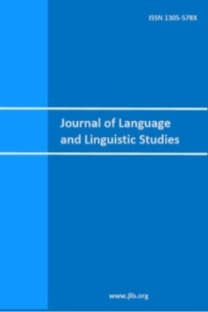The identification of difference between achievement levels of optional and compulsory English preparatory class students
Optional and compulsory preparation class; English achievement levels; portfolio; active participation
___
Aydın, E. (2007). An analysis of motivations, attitudes, and perceptions of the students at Tobb University of Economics and Technology toward learning English as a foreign language, Unpublished Master’s Thesis, Bilkent University, Ankara.Creswell, J. W. (2009). Research Design: Qualitative, Quantitative and Mixed Methods Approaches. London:Sage Publications.
Fishman, J. A., & García, O. (2010). Handbook of language and ethnic identity. Oxford University Press, USA.
Gerede, D. (2005). A curriculum evaluation through needs analysis: Perceptions of intensive English program graduates at Anadolu University, Unpublished Master’s Thesis, Anadolu University, Eskişehir.
Gottlieb, M. (1995). Nurturing student learning through portfolios. TESOL Journal, 5 (1), 12-14.
Günday, R. (2015). Approaches, methods, technique and multimedia tools in foreign language teaching. Ankara: Favori Publishing.
Harmer, J. (2001). The practice of English language teaching. Edinburgh Gate: Pearson.
İnal, B., & Aksoy, E. (2014). Evaluation of Çankaya University preparatory school curriculum, Journal of Research in Education and Teaching, 3(3), 85-98.
Long, M. H. (2009). Language teaching. In Long, M.H., & Doughty, C.J. (eds.), The Handbook of Language Teaching (pp.3-5) Oxford: Blackwell.
Şen Ersoy, N., & Kürüm Yapıcıoğlu, D. (2015). Evaluation of optional English preparatory program based on student and lecturer views. Journal of Qualitative Research in Education, 3(3), 7-43. http://dx.doi.org/10.14689/issn.21482624.1.3c3s1m [Online] www.enadonline.com
Tekin, M. (2015). Evaluation of a Preparatory School Program at a Public University in Turkey. The Journal of International Social Research, 8(36), 718-733.
Whong, M. (2011). Language teaching: Linguistic theory in practice. Edinburgh: Edinburgh University Press.
- ISSN: 1305-578X
- Yayın Aralığı: Yılda 4 Sayı
- Yayıncı: Hacettepe Üniversitesi
Form-meaning-use framework in grammar teaching: Research on noun clauses in writing skills
Impact of in-service training on English teachers classroom practice at primary level
The impact of sentence length and complexity on fluency in Turkish-English simultaneous interpreting
Digital storytelling: A multimodal narrative writing genre
A study on Turkish EFL teachers’ beliefs about assessment and its different uses in teaching English
The exploration of the self-efficacy beliefs of English language teachers and student teachers
English language assessment and evaluation practices in the 4th grade classes at main stream schools
İskender Hakkı SARIGÖZ, Fatıma Nur FİŞNE
The necessity of teaching culture in English as a foreign language courses: Iranian perspective
